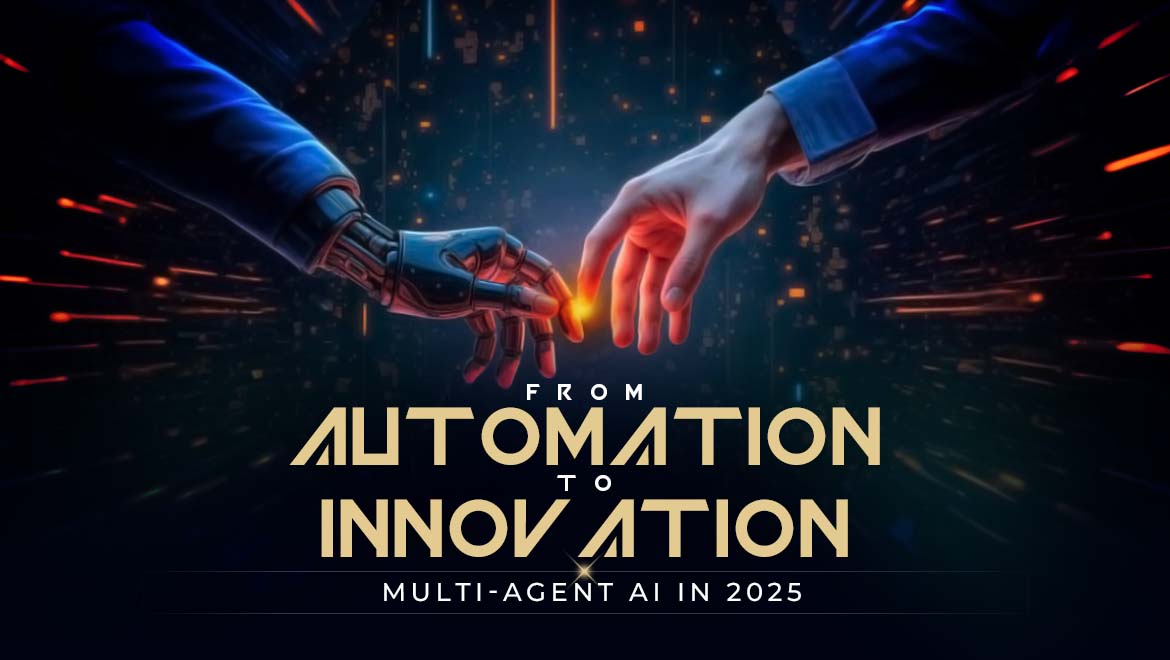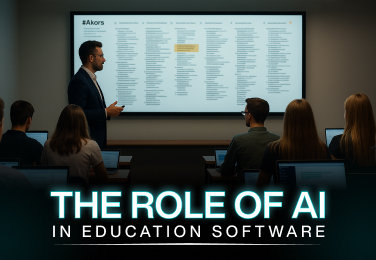

- By Admin
- 04 June, 2025
- 5 min Read
From Automation to Innovation: Multi-Agent AI in 2025
The concept of a multi-agent AI system is not entirely new! Since the 1980s, technologies have explored the idea of creating an artificially intelligent, single software entity. However, early models had certain limitations because of insufficient computing power, underdeveloped algorithms, and a lack of labeled data.
Fast forward to 2025, and today a rapid advancement in generative AI combined with the natural language capabilities of LLM (Large Language Models) has redefined this vision. While not the single AI entity originally envisioned, multi-agent AI is an advanced evolution of that idea.
These advanced systems consist of intelligent, intertwined AI tools, including large language models, smoothly integrated into software ecosystems. By enabling AI agents—each functioning as an LLM-powered application, function, or module—to interact and collaborate, multi-agent AI unleashes new levels of efficiency, automation, and decision-making.
Unveiling a New Dawn in Human-Computer Interaction
AI agents mark the new revolution in human-computer interaction, following graphical interfaces and command lines. As Bill Gates stated, these will redefine both the software industry and user interactions.
Their impact is clear—Salesforce reported a whopping $60 billion in AI-driven sales during Cyber Week 2024, while Deloitte forecasts that around 25% of organizations will embrace AI agent pilots by 2025, rising to 50% by 2027!
Key Applications in Modern Enterprise Operations
To fully appreciate the impact of multi-agent AI, it’s important to explore how the system can shape the modern enterprise operations—
Supply Chain Optimization
AI agents can track inventory levels in real-time, coordinate logistics, and predict demand fluctuations, ensuring a hassle-free supply chain. By thoroughly analyzing data patterns, these agents can facilitate just-in-time inventory management, minimizing costs and maximizing efficiency.
Financial Services
In the financial industry, AI agents play an important role in fraud detection by analyzing transaction patterns to detect anomalies. Additionally, they assist in credit scoring by evaluating consumer data, leading to more personalized financial services and accurate assessments.
Customer Service Automation
Enterprises are deploying the advanced AI agents to resolve complaints, handle consumer inquiries, and personalize customer experiences. These agents can analyze consumer data to provide tailored responses, improving satisfaction and loyalty.
Smart Manufacturing
In the manufacturing sector, AI agents control production lines and implement predictive maintenance. This proactive approach reduces downtime and ensures unmatched performance of equipment.
Enterprise Resource Planning (ERP)
AI agents boost ERP systems by integrating different functional groups within a company. They support decision-making, handle unstructured data, and offer comprehensive solutions across departments, fostering a more responsive and adaptive enterprise environment.
Smart Power Grids and Disaster Response
In the field of energy, AI agents manage electricity distribution by coordinating utilities, storage, and generators. They also play an important role in locating survivors, disaster response, mapping disaster sites, and making sure of the delivery of critical supplies.
Transportation Systems
AI agents optimize transportation by coordinating traffic light control, taxi dispatch, and ride-sharing services. They boost efficiency and mobility in urban environments, setting the stage for autonomous vehicles and smarter traffic management.
Healthcare
In the healthcare sector, AI agents coordinate patient care by optimizing hospital resources and offering precision medicine. By analyzing patient data, these advanced agents provide personalized medical treatments, enhance patient outcomes, and boost healthcare efficiency.
Multi-Agent AI—Key Challenges and Considerations
Despite the potential prospects, the widespread adoption of multi-agent AI systems comes with some challenges. Managerial resistance to job-replacing technology and concerns about managing accountability and reliability in a multi-agent ecosystem might hinder implementation.
Effective control systems as well as cautious implementation are important to harnessing the potential of artificial intelligence.
A Multi-Agent Future—Further Developments
The integration of multi-agent AI systems is rapidly gaining traction, with significant acquisitions and investments highlighting their potential. For instance, ServiceNow's $2.85 billion acquisition of Moveworks, an AI start-up focusing on employee support assistants, highlights the growing significance of AI agents in enterprise operations.
As these systems become more advanced, they are expected to operate with greater autonomy, minimizing the need for manual intervention in daily tasks. This shift will enable human workers to pay more focus on more strategic or complex activities, thus maximizing overall innovation and productivity within organizations.
Looking Ahead
The emergence of multi-agent AI marks a transformative era in modern enterprise operations. By enhancing decision-making and automating complex processes, these systems unlock new levels of innovation and efficiency.
As technology continues to evolve, the significance of AI agents in enterprises is set to grow exponentially, providing unprecedented opportunities for success and competitiveness across industries.

